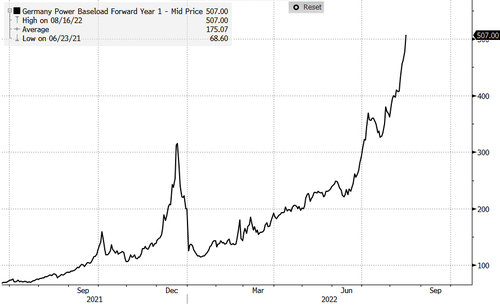Germany Denies WSJ Report Of Climate-Change Flip-Flop Over Nuclear Plants
Update: Following the WSJ report that indicated Germany plans to postpone the closure of its last three nuclear power plants, the German spokesperson for the Federal Ministry for Economic Affairs and Climate Action said the media report about extending the life of nuclear plants “lacks any factual basis.”
* * *
Germany has been mulling over the idea of extending the life of its nuclear power plant fleet for months as the ‘wait and see’ approach of Russia actually increasing Nord Stream 1’s NatGas capacity to normal levels ahead of winter is a dangerous one.
As German power prices surged above 500 euros per megawatt-hour on the European Energy Exchange AG for the first time as the energy crisis worsened, WSJ reported Tuesday that the largest economy in Europe would “postpone” the closure of its last three nuclear power plants.
Three senior government officials told WSJ that the decision to extend the life of its nuclear power plants has yet to be formally adopted by German Chancellor Olaf Scholz’s cabinet and will still need a parliamentary vote.
A formal decision could be made at the end of the month or early next month. Falling Russian NatGas supplies are the driver in extending the life of the nuclear power plants slated for closure on Dec. 31.
“The reactors are safe until Dec. 31, and obviously they will remain safe also after Dec. 31,” a senior official said.
The three plants were approximately 6% of Germany’s power production in 2Q22, and at this point, the energy-stricken country can use all the various types of power generation it can get its hands on before winter.
Germany widely depends on NatGas-fired power plants and has reactivated mothballed coal-fired power plants to increase power generation due to shortfalls in NatGas supplies.
The move to extend the life span of nuclear power plants and reactivate coal-fired power plants shows Germany has some short-term crisis management tools. However, they might not be enough to thwart an economic crisis as energy hyperinflation decimates households and businesses well before winter begins. Just look at power prices today…
Germany has three months to save itself from a winter energy crisis.
Tyler Durden
Tue, 08/16/2022 – 12:20

